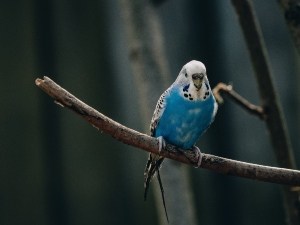
Your budgie can, unfortunately, become sick and start to suffer from a number of ailments and illnesses and some ailments and illnesses can cause some very scary symptoms in your bird.
This article is a look into why your budgie is vomiting undigested seeds.
Table of Contents
Budgie vomiting undigested seeds:
Birds will regularly regurgitate foods from the crop, but regurgitation and vomiting are two very different things.
Regurgitation happens when the birds bring up undigested food from their crop and place it where it wants to.
Vomiting happens when your bird’s gastrointestinal system forcefully brings food up, undigested or digested, and the food is forced out of the bird’s mouth.
The food will come up with the bird’s stomach acids, which taste bad, and as soon as this mixture of food and acid gets into the bird’s mouth the bird will flick its head around with its mouth open to get rid of the disgusting tasting stomach acids.
If your bird is throwing up undigested seeds then your bird may have an infection called avian gastric yeast.
This is what you need to know about it:
Avian gastric yeast:
This ailment is caused by a yeast called Macrorhabdus sp, and it affects and colonizes the bird’s gastrointestinal tract causing a variety of problems.
One of the problems caused includes vomiting, the vomiting can be caused by the macrohandois ornithogaseer on its own or other pathogens.
It is a very contagious disease and can affect a variety of birds including lovebirds, cockatiels, finches, parrotlets, chickens, partridges, ostriches, turkeys, and lovebirds.
It is quite common in smaller companion birds like the ones mentioned above.
Birds who have a weakened immune system also have a high chance of catching this ailment and becoming sick. It is common in birds who are between 2 and 3 years old.
This infection stops the bird’s stomach from being able to properly digest food and stops the bird’s stomach from being able to absorb the nutrients of the food that the bird eats.
The bird will eat as much as it normally would and will even eat more but the bird will still lose weight because the food is not being digested properly.
This will cause the bird to starve because it doesn’t have enough energy even though it is eating enough.
Symptoms of this disease:
In addition to your bird vomiting undigested seeds, a bird who is suffering from this condition can also suffer other symptoms including lethargy, weight loss, and diarrhea.
The diarrhea may also contain undigested seeds or pellets.
The infection can take one of two forms, acute or chronic. If the bird has the acute form then the bird will have bloody droppings, will stop eating, and the illness will stop the bird from being able to absorb nutrients.
Sick birds can sometimes get this disease and not show signs of being ill and this makes it easy for the disease to go undetected and move from one bird to another bird.
How its spread:
The pathogens that cause avian gastric can be spread from an adult bird to its offspring and it can also be spread from an adult budgie to an adult budgie.
The sick budgie can contaminate the communal drinking water and infect others, or, the sick bird can come into contact with a healthy budgie and infect the healthy bird when feeding or “kissing’ and spread the ailment.
A parent budgie can also spread it to their baby bird when regurgitating food into the baby’s mouth.
What to do:
Taking your bird to the vet is recommended, do this as soon as your can.
If you can’t immediately get the bird to the vet then it is advised that you isolate the bird to keep the other birds in your home from becoming infected with this ailment.
Put the sick bird in its own cage and give it its own food and water while in isolation. Taking samples of your budgie’s poop before taking the bird to the vet is also recommended.
Once you can get the bird to the vet the vet will examine the bird’s fresh droppings under a telescope and give you a diagnosis.
If it is found that your bird is suffering from this infection then medications will be prescribed to reduce the number of organisms in your bird’s body that is causing this illness.
The medications will also help boost the bird’s immune system.
Medications that your vet may give your bird include antifungals. The first line of defense will be Amphotericin B or the bird will be given Fluconazole if the Amphotericin does not work.
The duration of the bird’s treatment needs to be calculated by the vet. The bird may only need a short therapy or the bird may need to be treated for several weeks before it is cleared.
Unfortunately, your bird may relapse after recovering from this ailment.
If you enjoyed this article then you may also be interested in other bird related articles. Here are some articles that you may be interested in: Why Is My Bird Rubbing Its Face On Everything, Why Does My Conure Rub His Beak On The Cage?, Do Female Budgies Hump Things?, Lovebird Rubbing beak On Cage, Female Budgie Not Allowing Male To Mate, Why Do Conures Rub Their Beaks On Things?, Parakeets Mating But No Eggs, Do Budgies Like Blankets?, Why Do Parakeets Rub Their Beaks Together?,

